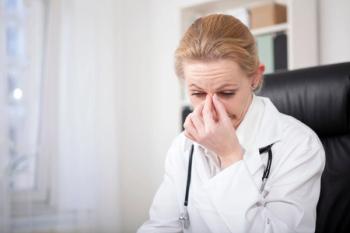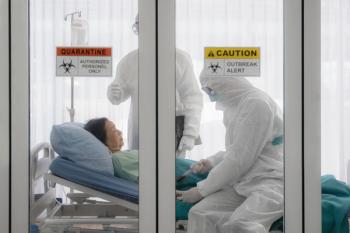
Coordinators provided vital human connection for patients, study finds.

Coordinators provided vital human connection for patients, study finds.

Cleveland Clinic begins charging for doctors’ time spent responding to some electronic messages.

Revisions to 2016 document focus on provider flexibility and unique circumstances of every prescribing decision.

Problem extends beyond costs of care and health insurance, study finds.

In study, use of text messages reduced post-discharge ED admissions and hospital readmissions.

Despite prevalence, few institutions have formal programs for addressing burnout.

A new study reveals how the COVID-19 pandemic worsened the already significant problem of burnout among doctors and other health care workers (HCWs).

Doctors have increased their use of electronic health information exchange (HIE) in recent years, but still face significant hurdles in using the technology to its full potential.

A study finds higher attrition rates among those with low incomes or from groups underrepresented in medicine.

Stress created by COVID-19 pandemic strengthens need for “whole-person care,” they say.

Black enrollees receive lower spending, have fewer primary care visits than white enrollees.

Most younger doctors now going into hospital medicine, study finds.

Nearly 9 million symptomatic cases also avoided.

Dissatisfaction with EHRs also tied to clinician turnover.

Bob White, COO of The Doctors Company, says most lawsuits occur due to patient frustration with not getting answers to their questions regarding an unexpected outcome.

Decrease comes despite rise in number of positions offered.

After 10 years women’s median earnings are 9% less than men’s.

Americans want the technology available, but most prefer in-person visits.

First-time visits up sharply, study finds.

Pandemic’s impact could worsen gender divide in income and career prospects, study finds.

Two possible explanations for declining contentment with live video calls as a form of care delivery.

The pandemic’s impact could worsen gender divide in income and career prospects, study finds.

A discussion about what affect under-insured patients will have on health care.

A new study suggests that reducing burnout requires an organization-level response — creating medical practice cultures that value qualities such as teamwork, open communications and process improvement.

185,000 adults with confirmed cases of COVID-19 were hospitalized in June and July. Of those, 182,000, or 98.3%, had not been vaccinated for the disease.